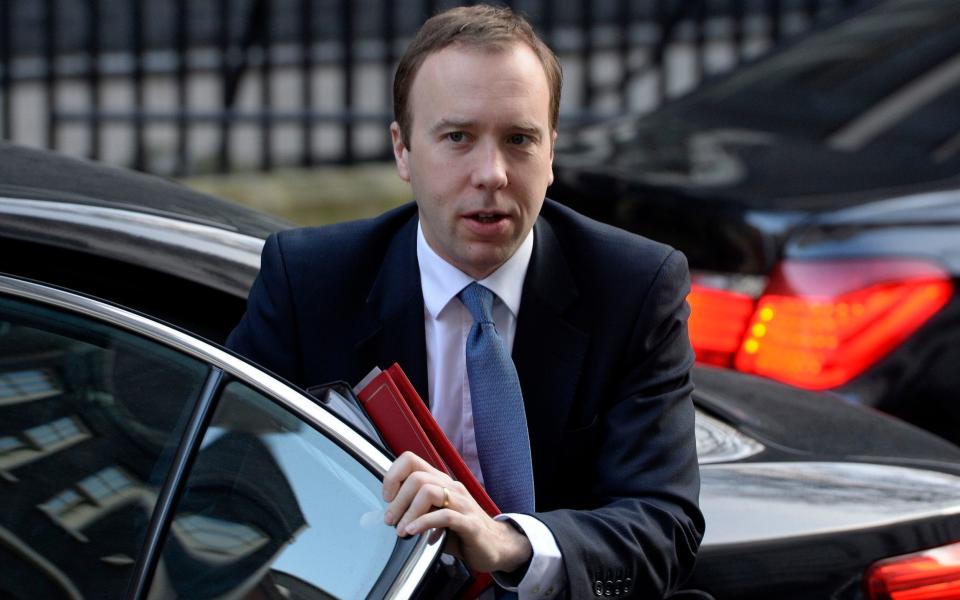Digital Minister tells SNP to 'get real' after Ofcom says Scotland behind England for superfast broadband

The SNP must “get real” about the slow rollout of superfast broadband in Scotland, the Digital Minister has said after the industry regulator confirmed it was lagging behind England and Wales.
Matt Hancock described the Nationalists’ performance as “lamentable” after Ofcom’s new Connected Nations report found 87 per cent of all premises in Scotland could access superfast broadband in May and June this year.
This compared with 92 per cent coverage in England, which also had faster average download speeds, and 89 per cent in Wales. Only Northern Ireland, with 85 per cent, had less coverage.
It said six per cent of Scottish premises could even not get “decent” broadband access – double the proportion in England (three per cent) and more than Wales (five per cent).
Warning of a “stark” urban-rural divide in Scotland and Northern Ireland, it said two per cent of properties in Scottish towns and cities could not get decent broadband compared with 27 per cent in the countryside.
Only 78 per cent of small businesses in Scotland could access a superfast connection, compared to 85 per cent in England and 81 per cent in Wales.
In an astonishing illustration of the lack of connectivity in rural Scotland, Ofcom found just 40 per cent of the landmass had mobile phone coverage compared to 70 per cent across the whole of the UK. Internet data coverage from mobile devices was even lower, at just 31 per cent of the landmass.
The report was published only three weeks after Fergus Ewing, the SNP’s Rural Economy Minister, insisted that “any assertion” that Scotland is behind the rest of the UK on superfast broadband rollout “is completely untrue.”
Derek Mackay, the Finance Minister, announced in Thursday’s Scottish Budget that a target of delivering superfast broadband to 95 per cent of premises would be met by the end of this month.
This would require an eight-point improvement in coverage since June, double the increase achieved in the previous year.
Headline #mobile stats from the #ConnectedNation report - stats for all 4 operators so total coverage is higher but clearly still big challenges pic.twitter.com/mUzpUBuXde
— BSG (@BSG_Team) December 15, 2017
Mr Hancock told the Telegraph last month he is “fed up” with the SNP government’s poor performance and accused them of “sitting on” £21 million they received in 2014 for the second phase of the rollout programme.
Both Mr Ewing and Nicola Sturgeon vehemently denied the claims but Mr Hancock said the Ofcom report showed he was right and suggested the Scottish Government was in denial.
The Digital Minister told the Telegraph: “The SNP need to get real. These figures lay bare how far Scotland is behind the rest of the UK.
“It’s a lamentable performance. It’s a pity that the Scottish Government has been sitting on millions of pounds of money we gave them more than three years ago, which could have been spent improving Scotland’s performance.”
John Lamont, the Tory MP for Berwickshire, Roxburgh and Selkirk, said the Ofcom report “confirms that the SNP are living in a parallel universe to the reality for many people in rural Scotland who have not been able to get superfast broadband.”
The report showed Scotland’s coverage increased by four points in the year to June, the joint-largest increase alongside Wales of the four home nations. The UK Government defines superfast broadband as 24Mbps.
Over the same period, the proportion that could not get “decent” broadband –the minimum threshold of 10Mbps – fell from nine per cent to six per cent. However, 140,000 premises were still not able to access this download speed.
Small business are still being missed by #superfast broadband (although likely doesn't consider ethernet/leased lines) #ConnectedNationspic.twitter.com/1NNDACgh2R
— BSG (@BSG_Team) December 15, 2017
Scotland’s outdoor mobile phone coverage has increased from 35 per cent to 40 per cent of the landmass over the past year but lags far behind England (88 per cent), Wales (62 per cent) and Northern Ireland (83 per cent).
Accessing data on a mobile phone is possible on only 31 per cent of Scotland, compared to 82 per cent of England, 52 per cent of Wales and 76 per cent of Northern Ireland.
Only 18 per cent of rural premises in Scotland can receive an indoor 4G service from all operators compared to 61 per cent in urban areas.

Similarly, Scotland has the lowest phone coverage on A and B roads (46 per cent). For England, the figure is 78 per cent, for Wales 53 per cent and for Northern Ireland 62 per cent.
Ofcom said this is due to “the challenges in delivering coverage across the large and often mountainous areas of Scotland with low population densities.”
The Scottish Government said Scotland had seen the largest increase in superfast broadband coverage across the UK in the previous 12 months “despite the significantly more challenging geography.”
A spokesman said: “We are the only government in the UK to commit to delivering superfast broadband coverage to every single home and business by the end of 2021 – backed by a substantial £600 million investment unveiled in this week’s budget.”
Drew Hendry, an SNP MP, said Mr Hancock’s attack was “ridiculous and embarrassing” the day after the Budget announcement.
He said: “The fact is, despite the considerably more challenging geography north of the Border, broadband is being rolled out at a far faster pace in Scotland than it is elsewhere in the UK, and it will offer considerably faster connection speeds that the second-rate service that Mr Hancock’s government are offering people in England.”

 Yahoo News
Yahoo News 